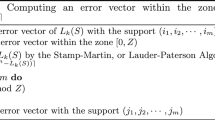Abstract
Several fast algorithms for the determination of the linear complexity of d-periodic sequences over a finite field \({\mathbb F}_q\), i.e. sequences with characteristic polynomial f(x) = x d − 1, have been proposed in the literature. In this contribution fast algorithms for determining the linear complexity of binary sequences with characteristic polynomial f(x) = (x − 1)d for an arbitrary positive integer d, and \(f(x) = (x^2+x+1)^{2^v}\) are presented. The result is then utilized to establish a fast algorithm for determining the k-error linear complexity of binary sequences with characteristic polynomial \((x^2+x+1)^{2^v}\).
Similar content being viewed by others
References
Chen, H.: Fast algorithms for determining the linear complexity of sequences over GF(p m) with period 2t n. IEEE Trans. Inf. Theory 51, 1854–1856 (2005)
Chen, H.: Reducing the computation of linear complexities of periodic sequences over GF(p m). IEEE Trans. Inf. Theory 52, 5537–5539 (2006)
Cusick, T.W., Ding, C., Renvall, A.: Stream Ciphers and Number Theory. North-Holland, Amsterdam (1998)
Dai, Z.D., Yang, J.H.: Linear complexity of periodically repeated random sequences. In: Davies, D.W. (ed.) Advances in Cryptology – EUROCRYPT’91, Lecture Notes in Computer Science, vol. 547, pp. 168–175. Springer, Berlin (1991)
Ding, C.: A fast algorithm for the determination of linear complexity of sequences over GF(p m) with period p n. In: The Stability Theory of Stream Ciphers, Lecture Notes in Computer Science, vol. 561, pp. 141–144. Springer, Berlin (1991)
Ding, C., Xiao, G., Shan, W.: The stability theory of stream ciphers. In: Lecture Notes in Computer Science, vol. 561. Springer, Berlin (1991)
Fu, F.W., Niederreiter, H., Su, M.: The expectation and variance of the joint linear complexity of random periodic multisequences. J. Complex. 21, 804–822 (2005)
Fu, F.W., Niederreiter, H., Özbudak, F.: On the joint linear complexity of linear recurring multisequences. In: Li, Y.Q., et al. (eds.) Proceedings of the Int. Workshop on Coding and Cryptology, pp. 125–142. Fujian, China, June 2007 (2008)
Games, R.A., Chan, A.H.: A fast algorithm for determining the complexity of a binary sequence with period 2n. IEEE Trans. Inf. Theory 29, 144–146 (1983)
Lauder, G.B., Paterson, K.G.: Computing the linear complexity spectrum of a binary sequence of period 2n. IEEE Trans. Inf. Theory 49, 273–280 (2003)
Lidl, R., Niederreiter, H.: Finite Fields. Addison-Wesley, Reading (1983)
Massey, J.L., Costello, D.J., Justesen, J.: Polynomial weights and code constructions. IEEE Trans. Inf. Theory 19, 101–110 (1973)
Meidl, W.: Reducing the calculation of the linear complexity of u2v-periodic binary sequences to Games-Chan algorithm. Designs Codes Cryptogr. 46, 57–65 (2008)
Meidl, W., Niederreiter, H.: Linear complexity, k-error linear complexity, and the discrete Fourier transform. J. Complex. 18, 87–103 (2002)
Meidl, W., Niederreiter, H.: On the expected value of the linear complexity and the k-error linear complexity of periodic sequences. IEEE Trans. Inf. Theory 48, 2817–2825 (2002)
Meidl, W., Niederreiter, H.: The expected value of the joint linear complexity of periodic multisequences. J. Complex. 19, 61–72 (2003)
Niederreiter, H.: Sequences with almost perfect linear complexity profile. In: Chaum, D., Price, W.L. (eds.) Advances in Cryptology—Proceedings of EUROCRYPT 1987, Lecture Notes in Computer Science, vol. 304, pp. 37–51. Springer, Berlin (1988)
Salagean, A.: On the computation of the linear complexity and the k-error linear complexity of binary sequences with period a power of two. IEEE Trans. Inf. Theory 51, 1145–1150 (2005)
Stamp, M., Martin, C.F.: An algorithm for the k-error linear complexity of binary sequences with period 2n. IEEE Trans. Inf. Theory 39, 1398–1401 (1993)
Xiao, G., Wei, S., Lam, K.Y., Imamura, K.: A fast algorithm for determining the linear complexity of a sequence with period p n over GF(q). IEEE Trans. Inf. Theory 46, 2203–2206 (2000)
Xiao, G., Wei, S.: Fast algorithms for determining the linear complexity of period sequences. In: Menezes, A., Sarkar, P. (eds.) Progress in Cryptology—INDOCRYPT 2002, Lecture Notes in Computer Science, vol. 2551, pp. 12–21. Springer, Berlin (2002)
Acknowledgement
The author would like to thank the anonymous referee for suggestions that helped to improve the paper.
Author information
Authors and Affiliations
Corresponding author
Rights and permissions
About this article
Cite this article
Meidl, W. How to determine linear complexity and k-error linear complexity in some classes of linear recurring sequences. Cryptogr. Commun. 1, 117–133 (2009). https://doi.org/10.1007/s12095-008-0007-6
Received:
Accepted:
Published:
Issue Date:
DOI: https://doi.org/10.1007/s12095-008-0007-6



